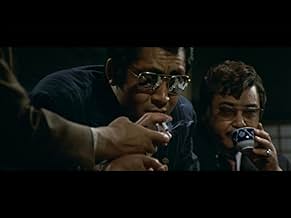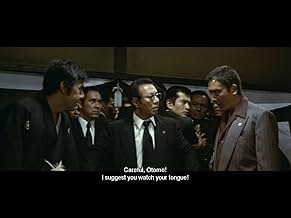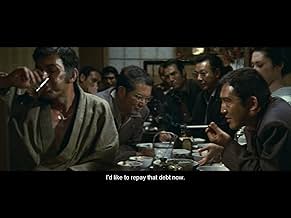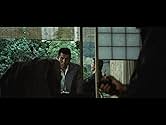IMDb RATING
7.3/10
1.3K
YOUR RATING
While Hirono is in prison, his rival Takeda turns his own crime organization into a political party, whose two executives stir up new tensions in their thirst for power.While Hirono is in prison, his rival Takeda turns his own crime organization into a political party, whose two executives stir up new tensions in their thirst for power.While Hirono is in prison, his rival Takeda turns his own crime organization into a political party, whose two executives stir up new tensions in their thirst for power.
Jô Shishido
- Katsutoshi Otomo
- (as Joe Shishido)
- Director
- Writers
- All cast & crew
- Production, box office & more at IMDbPro
Featured reviews
How successful could a fifth film in this series be? The fourth reclaimed much of the vitality that had made the first so great, if in a different manner, but where would another entry go based on the prior ending? The series had already seen its ups and downs as the first sequel, though still very good, was a small step down, and the third entry was notably one or two further steps down; how might the 'Final episode' compare? What could we expect of it in terms of film-making and storytelling style? As screenwriter Kasahara Kazuo had handed over the reins to Takada Koji for this last installment, what might a changing of the guard mean for the franchise, even as other members of the cast and crew returned once more? If Kasahara struggled to devise his last two screenplays, and accordingly struggled even more to conjure material for another, what might Takada have made of those efforts in his stead? These are the reasonable questions facing the last 'Battles without honor and humanity' as it begins, not to mention the knowledge in retrospect that the real-life yakuza who inspired the series in the first place apparently no longer regarded the cinematic creations well. Gratifyingly, though it is not free of its own issues, I'm inclined to think that this movie also carries its own strong, lasting value. It's not the same 'Battles' as any of its predecessors per se, but five entries in, that's not a bad thing.
Though the incidence hasn't been perfect all along, five pictures deep, the trajectory of the ongoing narrative definitely mirrors, at the first and the last, how the installments are approached in terms of both film-making and storytelling style. The progenitor explored the violence of the yakuza in the early post-war years as Japan rebuilt, and it's quite fitting that as both written and executed it would bear wild, chaotic energy that was a veritable shot in the arm for the genre. The third film, sadly plodding though it mostly was with extreme reliance on dialogue, was notably about alliances shifting behind closed doors; take that as you will. Now, as 'Final episode' finds Japan in an era of growing prosperity with vanishing room for criminal enterprises - leaving the yakuza to try to find their place in the new Japan, and struggling to kick bad habits - the final entry feels all the more like a more ordinary crime flick, mixing both drama and action. It's a big few steps away from what initially grabbed our attention in January 1973, but just as immediate predecessor 'Police tactics' was more balanced, finessed, and finely honed, I believe the same is true this time around. Under these circumstances the health of the writing is again more important, and though the screenplay has weaknesses, I rather think the problems Takada faced don't show up so much in the finished product. The core thrust is the most complicated of the series as yakuza clans form a loose coalition to try to go legitimate, but younger members and some old dogs are itching for a fight, resulting in continued trouble in the streets.
Much more than not Takada pulls out a win with his characters of disparate motivations, allegiances, and personalities, a sturdy narrative, robust dialogue, and as under Kasahara's tenure, firm and reliable scene writing. One stumbling block Takada does run into is that where the story deals once more, in some measure, with shifting alliances behind closed doors, scenes that are extra heavy with dialogue bog down the proceedings just as happened in 'Proxy war.' It also seems to me that a staple of the series - irregular pauses for narration and still images to provide context, and swiftly and concisely advance the plot - is more proliferate in this final run. Maybe that means Takada was at a loss of how to flesh out the story otherwise, or maybe that means the story was too big for one feature; maybe it was the best way to communicate some ideas, or maybe it was a cop-out, and the easiest path forward, One way or another, the use is abundant and noteworthy. Still, it remains the case that overall this fifth iteration remains pretty well balanced, and there is also plenty of violence to accompany the tale, and a fairly consistent is slightly uneven buzz of electricity to sustain some diminished level of the vibrancy that has marked the saga at its best.
All told there is nothing remarkable or spellbinding about this title, certainly not like we got in the original, but as I see it the conclusion is nevertheless roundly solid. Tsushima Toshiaki's music is again a flavorful complement where it rears its head. Fukasaku Kinji's direction is a steady anchor for the series, and likewise Miyamoto Shintaro's editing and Yoshida Sadaji's cinematography - if more restrained and conventional than before. The stunts, effects, and action sequences that are employed are sharp and invigorating in their bursts (though not necessarily as resplendently unfettered as in the past). The filming locations are swell, and in general those behind the scenes turned in excellent work with regards to production design, art direction, costume design, sound, and so on. If lacking the utmost power that 'Battles without honor and humanity' has enjoyed at its best, 'Final episode' has little sparks of brilliance all throughout that help to maintain engagement, primarily in Takada's writing and Fukasaku's direction. At this point in the series there was all too much potential for the whole endeavor to wear thin, so those little sparks may be more significant than they first appear in and of themselves, and regardless, they are most welcome as they demonstrate that the films still had something to offer.
One hundred minutes pass quickly and smoothly, a good sign of how compelling, entertaining, and satisfying the movie is through to the end as one age of the yakuza fades to be replaced by another. It has some relative shortcomings, perhaps, but the fact is that there are no flaws so severe as to leap out as major detractions. I believe this stands quite squarely alongside 'Deadly fight in Hiroshima,' if not in the same fashion, and it's maybe only a small degree apart from the progenitor and 'Police tactics' when it comes to broad quality - while claiming a look and feel that most closely approximates the latter. It's safe to say that I had mixed expectations when I sat to watch, so at length I'm pleased that the franchise was able to end on a high note. In my opinion it holds true that only the first 'Battles without honor and humanity' is so exceptional as to demand viewership, but all its successors are deserving in some capacity, and the saga that began with such a stunning flash wraps up with a meaningful, open-ended resolution. It won't find equal favor with all comers, but for my part I very much like 'Final episode,' and I'm happy to give it my hearty recommendation.
Though the incidence hasn't been perfect all along, five pictures deep, the trajectory of the ongoing narrative definitely mirrors, at the first and the last, how the installments are approached in terms of both film-making and storytelling style. The progenitor explored the violence of the yakuza in the early post-war years as Japan rebuilt, and it's quite fitting that as both written and executed it would bear wild, chaotic energy that was a veritable shot in the arm for the genre. The third film, sadly plodding though it mostly was with extreme reliance on dialogue, was notably about alliances shifting behind closed doors; take that as you will. Now, as 'Final episode' finds Japan in an era of growing prosperity with vanishing room for criminal enterprises - leaving the yakuza to try to find their place in the new Japan, and struggling to kick bad habits - the final entry feels all the more like a more ordinary crime flick, mixing both drama and action. It's a big few steps away from what initially grabbed our attention in January 1973, but just as immediate predecessor 'Police tactics' was more balanced, finessed, and finely honed, I believe the same is true this time around. Under these circumstances the health of the writing is again more important, and though the screenplay has weaknesses, I rather think the problems Takada faced don't show up so much in the finished product. The core thrust is the most complicated of the series as yakuza clans form a loose coalition to try to go legitimate, but younger members and some old dogs are itching for a fight, resulting in continued trouble in the streets.
Much more than not Takada pulls out a win with his characters of disparate motivations, allegiances, and personalities, a sturdy narrative, robust dialogue, and as under Kasahara's tenure, firm and reliable scene writing. One stumbling block Takada does run into is that where the story deals once more, in some measure, with shifting alliances behind closed doors, scenes that are extra heavy with dialogue bog down the proceedings just as happened in 'Proxy war.' It also seems to me that a staple of the series - irregular pauses for narration and still images to provide context, and swiftly and concisely advance the plot - is more proliferate in this final run. Maybe that means Takada was at a loss of how to flesh out the story otherwise, or maybe that means the story was too big for one feature; maybe it was the best way to communicate some ideas, or maybe it was a cop-out, and the easiest path forward, One way or another, the use is abundant and noteworthy. Still, it remains the case that overall this fifth iteration remains pretty well balanced, and there is also plenty of violence to accompany the tale, and a fairly consistent is slightly uneven buzz of electricity to sustain some diminished level of the vibrancy that has marked the saga at its best.
All told there is nothing remarkable or spellbinding about this title, certainly not like we got in the original, but as I see it the conclusion is nevertheless roundly solid. Tsushima Toshiaki's music is again a flavorful complement where it rears its head. Fukasaku Kinji's direction is a steady anchor for the series, and likewise Miyamoto Shintaro's editing and Yoshida Sadaji's cinematography - if more restrained and conventional than before. The stunts, effects, and action sequences that are employed are sharp and invigorating in their bursts (though not necessarily as resplendently unfettered as in the past). The filming locations are swell, and in general those behind the scenes turned in excellent work with regards to production design, art direction, costume design, sound, and so on. If lacking the utmost power that 'Battles without honor and humanity' has enjoyed at its best, 'Final episode' has little sparks of brilliance all throughout that help to maintain engagement, primarily in Takada's writing and Fukasaku's direction. At this point in the series there was all too much potential for the whole endeavor to wear thin, so those little sparks may be more significant than they first appear in and of themselves, and regardless, they are most welcome as they demonstrate that the films still had something to offer.
One hundred minutes pass quickly and smoothly, a good sign of how compelling, entertaining, and satisfying the movie is through to the end as one age of the yakuza fades to be replaced by another. It has some relative shortcomings, perhaps, but the fact is that there are no flaws so severe as to leap out as major detractions. I believe this stands quite squarely alongside 'Deadly fight in Hiroshima,' if not in the same fashion, and it's maybe only a small degree apart from the progenitor and 'Police tactics' when it comes to broad quality - while claiming a look and feel that most closely approximates the latter. It's safe to say that I had mixed expectations when I sat to watch, so at length I'm pleased that the franchise was able to end on a high note. In my opinion it holds true that only the first 'Battles without honor and humanity' is so exceptional as to demand viewership, but all its successors are deserving in some capacity, and the saga that began with such a stunning flash wraps up with a meaningful, open-ended resolution. It won't find equal favor with all comers, but for my part I very much like 'Final episode,' and I'm happy to give it my hearty recommendation.
I would have said "awful" but the other films were so great! It was such a disappointment after watching the others. At the end of the film there were too many loose ends, so much left behind unresolved with no closure for the main character or more importantly, the viewer. At this point in the series, I was having problems as well with everyone's inability to hold a gun straight. And why were they always falling down on the people they shot?
All I can say is that if this is based on the memoirs of a Yakuza boss, and these films held true to story... only then can I accept this "real" ending. Otherwise what a let down. Maybe I'm just sad it's over.
All I can say is that if this is based on the memoirs of a Yakuza boss, and these films held true to story... only then can I accept this "real" ending. Otherwise what a let down. Maybe I'm just sad it's over.
With the authorities cracking down on organized crime, many yakuza families prolonged their existences by becoming political parties. The cops weren't fooled, but it did make it harder to prosecute them.
The talkiest of the entries and the entry burdened with the task of wrapping up dozens of loose threads, FINAL EPISODE depicts the legitimization of the crime and protection business and draws a curtain on the life of Bunta Sugawara's symbolic yakuza "torpedo".
It is as compelling for its performances as for its historical detail. Right up until the last body falls, director Fukasaku keeps the energy level high and kicks the narrative along at a heady pace.
It has been a monumental journey and a classic, unforgettable piece of cinema.
The talkiest of the entries and the entry burdened with the task of wrapping up dozens of loose threads, FINAL EPISODE depicts the legitimization of the crime and protection business and draws a curtain on the life of Bunta Sugawara's symbolic yakuza "torpedo".
It is as compelling for its performances as for its historical detail. Right up until the last body falls, director Fukasaku keeps the energy level high and kicks the narrative along at a heady pace.
It has been a monumental journey and a classic, unforgettable piece of cinema.
After engaging but quite confusing 3rd and 4th episodes, this 5th (and final) one I could actually follow! Not 100% of the time, but I had a much better grasp on the plot than I did in the last two- maybe to the same extent as the slightly simpler 1st and 2nd episodes.
As such, I did enjoy this one more than 3 and 4. It has a great pace throughout, maybe only faltering a little at the end, as the final few scenes don't feel as appropriate a series finale as the last few scenes in episode 4 felt.
Still, for providing more of the stuff I love about this series alone, I can't help but think this was really good. The trademark violence and chaos that defines this series has only gotten better by this point- there's an action sequence (of sorts) just over the halfway point in this instalment where the camera seems to jolt or move every time a gun is fired or a punch is landed...
...And it doesn't look cheesy; it just accentuates the brutality of what's happening in an unbelievably effective fashion. Also noticeable is how messy and clumsy so many murders and attempted murders are. I really appreciate it when a crime film emphasises how unnatural and hard it is to take a life in that kind of violent way.
As such, I did enjoy this one more than 3 and 4. It has a great pace throughout, maybe only faltering a little at the end, as the final few scenes don't feel as appropriate a series finale as the last few scenes in episode 4 felt.
Still, for providing more of the stuff I love about this series alone, I can't help but think this was really good. The trademark violence and chaos that defines this series has only gotten better by this point- there's an action sequence (of sorts) just over the halfway point in this instalment where the camera seems to jolt or move every time a gun is fired or a punch is landed...
...And it doesn't look cheesy; it just accentuates the brutality of what's happening in an unbelievably effective fashion. Also noticeable is how messy and clumsy so many murders and attempted murders are. I really appreciate it when a crime film emphasises how unnatural and hard it is to take a life in that kind of violent way.
This fabulous Yakuza saga scattered in five chapters since post war era until early seventies portrait an ultra-violence offering, despite the formulaic success it became a slight repetitive letting it somehow boring on successive and never-ending clashing over the opposite sides of the recently stablished Tensei organization as political party to cover up their criminal activities.
It starting in August 6th on annual march for atomic bomb event at Hiroshima, due the former Boss Hirono (Bunta Sugawara) was in jail, his successor Akira Kobayashi ought changing of the guard to younger Matsumura (Seizô Fukumoto) to dismay of the older members, it triggers a so awaited strife among Tensei to the extent of a near breakage.
Soon Hirono was release from prison moth-eaten by the pain by his brother death, thus it demanding a settlement aiming for maintain the peaceful on the business, however the former boss Akira Kobayashi tries an odd deal with Hirono to appease acrimony offering both for a retirement on behalf of a newest commanders, it wouldn't be so easy as he might think, the bloodshed will proceed.
Thanks for reading.
Resume:
First watch: 2024 / How many: 1 / Source: DVD / Rating: 7.25.
It starting in August 6th on annual march for atomic bomb event at Hiroshima, due the former Boss Hirono (Bunta Sugawara) was in jail, his successor Akira Kobayashi ought changing of the guard to younger Matsumura (Seizô Fukumoto) to dismay of the older members, it triggers a so awaited strife among Tensei to the extent of a near breakage.
Soon Hirono was release from prison moth-eaten by the pain by his brother death, thus it demanding a settlement aiming for maintain the peaceful on the business, however the former boss Akira Kobayashi tries an odd deal with Hirono to appease acrimony offering both for a retirement on behalf of a newest commanders, it wouldn't be so easy as he might think, the bloodshed will proceed.
Thanks for reading.
Resume:
First watch: 2024 / How many: 1 / Source: DVD / Rating: 7.25.
Did you know
- TriviaIn one of the final scenes, several yakuza members approach a theatre playing Onna Toseinin, aka Onna toseinin (1971) and ogle the poster featuring Sumiko Fuji as the latter movie's theme music plays. Onna Toseinin is a "ninkyo eiga" or "chivalry film" in which yakuza are portrayed in a romanticized way as honorable, upstanding citizens, or cool, wandering gamblers. This is certainly meant as a strong contrast to the "jitsuroku eiga" / "actual record film", or true crime style of this Battles Without Honour and Humanity series, in which modern yakuza are more accurately portrayed as brutally destructive, craven goons engaging in chaotic violence and murder. Ironically, Yumiko Nogawa who appears in this film as a yakuza wife, 12 years earlier appeared in an early ninkyo eiga series of her own as a similar wandering woman gambler character, Toba no mesu neko (1965).
- ConnectionsFeatured in Game One: Rage, Might & Magic: Heroes 6 (2011)
Details
- Release date
- Country of origin
- Language
- Also known as
- The Yakuza Papers, Vol. 5: Final Episode
- Filming locations
- Production company
- See more company credits at IMDbPro
- Runtime1 hour 40 minutes
- Sound mix
- Aspect ratio
- 2.35 : 1
Contribute to this page
Suggest an edit or add missing content

Top Gap
By what name was Jingi naki tatakai: Kanketsu-hen (1974) officially released in India in English?
Answer



























